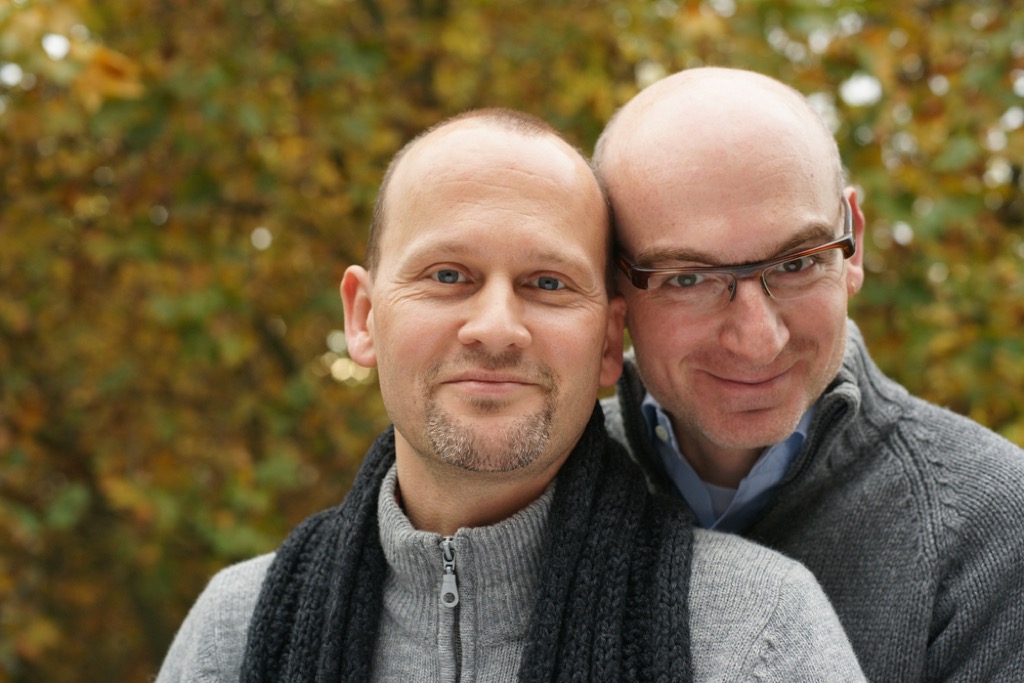With the help of mental health professionals, we’ve rounded up the biggest regrets people have over 50. And if you want to enjoy your time on earth more, check out the 20 Top Tricks from Therapists on Finding Happiness. A little altruism can go a long way when it comes to avoiding regret later in life. The results from the Allianz survey suggest that more than a fifth of people would prioritize volunteering if they had more time. “Contributing to society by volunteering, supporting important causes, or in some way making a difference to the community or state of the world is widely valued, [but] realizing they did not do anything significant with their lives is a very common regret,” says postgraduate psychiatry resident Patricia Celan, MD. And if you’re eager to give back, start with these 33 Little Acts of Kindness You Can Do That Are Totally Free. Relationships don’t always work out, and it’s rarely easy on either party involved. Unfortunately, many people realize too late that they could have done more to keep their relationship healthy. “People regret how they treated their spouse, parents, or children, whether that was neglectful and dismissive treatment or in some way abusive,” says Celan. And for more great information delivered to your inbox, sign up for our daily newsletter. Of course, not every relationship is a good one, and many people find themselves regretting the time they wasted on partners who didn’t value them or were abusive. “People feel regret for letting the relationship last as long as it did,” says licensed therapist Eric Patterson, LPC. “If they had to do it all again, they would end the relationship at the first indication of trouble.” Wondering about something that could’ve changed the course of your life is not abnormal for folks over 50. Decades later, you may find yourself thinking about what would have happened if you had been brave enough to ask that cute classmate out in high school. Few relationships can indefinitely maintain the passion they had in their first weeks or months, but that ends up leading to some serious regrets. According to 2012 research from Northwestern’s Kellogg School of Management, 18.1 percent of study subjects cited romantic relationships as the biggest source of regret. And if you want to improve your life, check out these 50 Happiness Hacks That Are Entirely Backed by Science. When you’re in your 60s, 70s, and 80s, it’s unlikely that you’ll look back fondly on those nights you spent toiling away at work while your partner tried to connect with you. “We cannot turn back the clock and build better relationships,” says Colorado-based psychologist and life transitions expert Elisa Robyn, Ph.D. Divorce can be the best choice for a couple, but it can also be a source of regret later if it’s too hasty or too hostile. In one 2016 survey by Avvo, 27 percent of women polled admitted to regretting their divorces, while 39 percent of men said the same. While giving up on your marriage too quickly may be a regret for some, many others find themselves wishing they’d left a bad relationship sooner. Licensed marriage and family therapist Elisabeth Goldberg says that, among her patients, “staying in a bad marriage is the number one regret of people over 50.” And while many couples say they stay married for their children, Goldberg cautions against doing so. “Children of divorce often say they wish their parents separated sooner,” she notes. Sure, it may feel good to protect yourself by holding onto a grudge after someone has wronged you, but odds are you’ll live to regret it later. Few people go to their grave thinking, “I’m so glad I stayed angry at that person.” “We hold onto our own wounds and sorrows when we do not forgive,” says Robyn. “Often we forget what we were even upset about, or realize that in the scheme of life, it was a minor hurt.” Many parents find themselves regretting choices they’ve made, but few weigh on them quite as heavily as their lack of foresight when it came to preparing their kids for adulthood. “We do a lot of pampering with this generation and we forget to teach life skills,” says therapist Stacy Haynes, Ed.D, LPC. You’ve probably heard the old adage about parenting: The days are long, but the years are short. In many cases, one of the biggest regrets parents have is not spending more time bonding with their children when they had the chance. “Many people regret spending too much time at work and not enough time with [their] children,” says Robyn. “We often focus on providing or perhaps succeeding, but forget that our families will not be with us forever.” We only get a certain number of years to spend with our parents. Sadly, many people take those familial bonds for granted while their moms and dads are still alive, only to regret it once they’ve passed. “Many people wonder later what else they might have learned from their parents,” says Robyn. Having a good relationship with your parents can be a wonderful thing. However, trying to live up to their expectations, no matter the personal cost, is a major source of regret in many people’s lives. According to the Allianz study, a shocking 35 percent of respondents admitted they wished they had pursued more of the things they wanted to do, not just the ones expected of them. “Do you ever wonder why some people have a mid-life crisis at 50?” asks Robyn. “[It’s because] we have bent to the pressure of fitting into our family’s or culture’s expectations and wonder if it was worth it.” Relationships end for a variety of reasons, but few people will tell you that they wished they had been less romantic after all is said and done. In fact, skipping those little chances to show someone how special they are to you with a romantic gesture is often a major regret later in life. Whether it’s never pursuing the right job or not finding hobbies that spark your interest, a lack of fulfillment is a major regret for many people. “They might have allowed their limiting beliefs or other peoples’ opinions to get in the way of them achieving their goals,” explains therapist Emma Demar, LMSW. “Consequently, they end up feeling like they have not lived their lives in a way that made them feel fulfilled and truly happy.” Everyone can be self-critical from time to time, but if you let those harsh criticisms dictate the way you’ve lived your life, odds are you’ll come to regret it. “The regret is that so much time has been wasted being your own worst enemy instead of learning how to truly love yourself,” says Demar. While deciding to get counseling can be a tough decision to make, many people regret not doing so sooner when they realize how much it improves their life. “Most people wait until they are in a desperate place to seek out help,” explains therapist Whitney Owens, LPC, MA. “Almost every client tells me that they wish they had come earlier.” While the idea of sitting in a classroom taking tests may not appeal to everyone, missing out on educational opportunities is actually a major source of regret for many people later in life. According to research published in Personality and Social Psychology Bulletin in 2008, education was the number one category in which study subjects cited regret, compared to career, romance, parenting, self-improvement, and leisure. Although it’s a subjective matter, many people find themselves regretting not achieving certain accomplishments as they age. “What troubles people in later life are the chances they didn’t take or achievements they didn’t accomplish,” explains Karen R. Koenig, M.Ed., LCSW, a licensed psychotherapist, motivational speaker, and international author in Sarasota, Florida. In fact, according to a 2018 study published in the journal Emotion, 72 percent of adults surveyed expressed regret over their perceived failure to live up to their own ideal self-image. Being turned down from a job never feels good. However, what’s worse, in the long run, is never trying at all. According to the Allianz survey, among a group of 3,000 Americans, 38 percent of study subjects admitted that they wished they had taken more career risks. Sure, it may seem like working constantly will get you where you want to go in your career. But, when looking back at their lives, few people ever say, “I wish I had spent more Saturdays at the office.” As palliative care nurse Bronnie Ware writes on her blog, working too hard at the expense of a personal life is one of the most commonly-cited regrets among the dying. “All of the men I nursed deeply regretted spending so much of their lives on the treadmill of a work existence,” she notes. It may not be fun or glamorous in the moment, but saving some extra cash might help you alleviate some regrets in your later years. It turns out, money issues, including not saving enough for retirement, are among the biggest regrets people have later in life. One 2019 study by Natixis Investment Managers found that the average 45-year-old wants to retire at 64, but has saved just $166,328. That means that in order to retire with just under $1 million, they’ll need to save at least $42,000 a year. Not snagging Google stock when you had the chance? You’re not alone. People tend to regret not making the most of their financial assets as they get older. “We often regret a chance not taken,” says Robyn. According to a 2014 study conducted by Glassdoor, the average American employee only takes about half of their allotted time off from work. And those who don’t use their hard-earned vacation time to get true R&R feel similarly. When Priceline released their Work-Life Balance Report in 2018, they found that 41 percent of people reported that “obligation” trips (i.e. weddings, bachelor parties, baby showers, etc.) were among their top regrets when it came to how they used their paid time off. Travel may be an expensive habit, but those who stick close to home often find themselves regretting it later in life. In the Allianz survey, 56 percent of the respondents said they would have traveled more if they had to do things again. An adventurous spirit is something that’s inherent to some and not others. But many people wish they had figured out a way to tap into theirs. According to that Allianz study, not being more adventurous was cited as a regret by a quarter of survey participants.ae0fcc31ae342fd3a1346ebb1f342fcb Whether it’s that time you turned down a last-minute Vegas vacation or your decision to not get up on stage at that concert, a lack of spontaneity is often a major regret down the line. “Would one expensive vacation really have been a bad idea?” asks Robyn. As we age, many people also feel disappointed about not taking better care of themselves, particularly in terms of their food choices. Considering that diet is directly responsible for approximately 678,000 deaths in the United States alone each year, it’s safe to assume that many would opt for salads over cheeseburgers if they could do things over. Your health is one of those things you can rarely get back once it’s gone, and for most people, that leads to some serious regrets. According to a 1992 study published in the International Journal of Aging and Human Development, 13 percent of study subjects admitted regret about not taking better care of their health. With work, family commitments, and those futile attempts to find time to sleep, it’s no wonder we have so little time for social interactions as we get older. However, try to maintain those friendships while you can, or you’re likely to regret missing out. “It takes time for many people to realize how vital our friends are to our wellbeing,” explains Robyn. “When we face a life crisis or want to celebrate something wonderful, it is our friends who gather around us. Our long-term friends who know us well and share our history matter more as we age.” That time you went to that meeting instead of watching your daughter shine in her school play, or those nights you stayed in when your friends went out and had a blast? Don’t be surprised if those land on your list of regrets in your later years. “There is a reason we talk about bucket lists,” says Robyn. “We want to build memories that we can savor and experiences that we shared with family or friends. Or perhaps just memories that remind us that we lived fully.” Shyness is inherent for some of us. However, those fears holding us back from meeting new people and expanding our social circles can plague us later in life. And when you’ve done something hurtful to another person, few things feel better than offering a heartfelt apology and having the other person accept. Unfortunately, those who miss out on these opportunities often live to regret it. Although many people tend to take their parents or family members for granted in the early part of their lives, that feeling that you could have done more to express gratitude to someone you care about is a major source of regret later on. It’s only natural to care what other people think about you, but all those concerns about others’ opinions are likely to fall into your regret category as you get older. Few people look back on their life and think, “I wish I had let other people’s opinions factor into my decisions more.” Most people can think back to a time when they missed an opportunity to stand up to a bully. And when that missed chance means someone else got hurt—whether that’s emotional, mental, or physical pain—that regret may follow you for a lifetime. Assertiveness is a skill that many people unfortunately learn too late in life. Failing to stand up for yourself and what you believe in often ends up being a major regret among those who lack confidence. Not everyone can make a living doing the thing they love, and that’s to be expected. However, that doesn’t mean you won’t regret it. According to Allianz’s data, 39 percent of survey respondents admitted that they regretted not following their passion later in life. Your larger-than-life personality may not have a place at your buttoned-up office job, but hiding who you truly are to the people who care about you will rarely make you happy. Whether you’re simply toning down who you really are or you’re pretending to like or dislike things just to avoid ridicule, you’re bound to regret it as you age. That hunch you had about that so-called “friend?” That feeling you should have moved to a new city when you had the chance? For many people, the decision not to listen to those gut feelings comes back as a major regret later in life. Taking your life too seriously rarely breeds the kind of happiness most people aspire to have in their lives. If you can’t find it in your heart to have a sense of humor about even the biggest challenges you face in life, it might turn into a regret later on. Of course, bills need to be paid and food needs to be on the table. However, for many people looking back on their lives, always putting practicality first and fun second tends to be a serious regret. Knowing that you made someone happy in their lifetime can make anyone feel good. Knowing that you were unkind to someone, and didn’t take the steps necessary to fix it? That’s a major source of regret for most people. They say youth is wasted on the young, and that’s undeniably true. While you may have thought you were uncool, unattractive, and not so great at 18, in your later years, it’s highly likely you’ll regret not appreciating that fast metabolism or the lack of responsibilities you had as a young adult. Those hours you spent looking at your phone instead of being present? Don’t be surprised if you wish you had that time back in your 50s and beyond. Anxiety and stress are unavoidable for many people, but it’s unlikely that you’ll hit your later years and wish you had spent more time worrying about things. According to a 2016 report by Liberty Mutual Insurance, approximately 40 percent of the population worries every single day, but few wish they had wasted more hours doing so. Success is one goal, but it’s not the only goal people should be working toward. If you’re ignoring your own personal happiness in pursuit of success, or to make others happy, the odds are good that you’ll regret that decision once you’re over 50.
In our desire to be responsible adults, many of us wind up missing out on a lot of life’s fun. And while it may be nice to have that white picket fence and nuclear family, never letting your inner child out to play is a serious source of regret for many people. While our busy lives often get in the way of spending time with the people we love, it’s well worth doing so. Not seeing someone before their death is a major regret for many people, and sadly, one of the few that can’t be remedied. It’s also hard to know what people will say about you when you’re gone. Still, many people will admit that not considering their legacy was a serious oversight. Whether you wish you had had children, wish you had done more for the planet, or simply wish you had been kinder in life, the thought that people might have less-than-fond memories of you—or worse yet, no memories at all—can fill a person with regret. Luckily, at 50, you still have plenty of time to change your legacy for good. And if you want to turn your life around, check out these 50 Life Changes to Make After 50.















